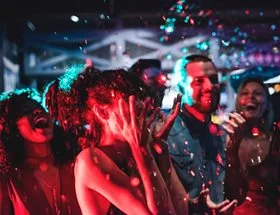Drink spiking is when alcohol or other drugs are intentionally added to someone’s drink without their knowledge or consent.
Drink spiking can happen anywhere, including pubs, clubs, parties, festivals and at home. People may spike drinks with the intent to hurt or steal from others or commit sexual assault; while others may spike drinks as a ‘prank’ to get someone drunk or high.
Drink spiking is illegal in all Australia states and territories, regardless of the intent. Penalties include fines and imprisonment. This means adding alcohol or other drugs to someone’s drink is against the law. Even if they don’t drink it or the person isn’t harmed.

What is drink spiking?
Drink spiking can include:
- Adding alcohol to a non-alcoholic drink
- Adding extra alcohol into an alcoholic drink
- Slipping prescription or illegal drugs into an alcoholic or non-alcoholic drink
Alcohol is the most common drug used in drink spiking incidents.1
Symptoms of drink spiking
Drugs used to spike drinks, including alcohol, are often colourless and odourless, making it difficult to see, smell or tastes.
Some symptoms of drink spiking can be:1
- Feeling sick or sleepy
- Feeling dizzy or faint
- Feeling drunk when you have only had a small amount of alcohol
- Passing out
- Memory loss
- Difficulty walking, controlling body or talking
- Blackouts, which can be for extended periods of many hours
What should you do if you suspect drink spiking?
If you think your drink has been spiked or are with someone who may have had their drink spiked:
- Ask someone you trust to get you to a safe place
- If you are at a venue, let staff know you think your drink has been spiked
- If you or someone you know feel unwell or have been sexually assaulted, call 000 or go to the nearest emergency department. You can contact the Sexual Assault Resources Centre at any time of the day or night on (08) 6458 1828 or 1800 199 888 (free from landlines)
- If you or someone you know suspects a drink has been spiked, it is important report it to the Police. Reporting within 24-hours means blood or urine tests can be conducted and may assist in confirmation of a drink spiking incident and collection of evidence for prosecution. Testing is available in the metropolitan area at any 24-hour police station and at all police stations in regional WA
Fore more, visit the WA Police website.

Tips to stay safe
- Keep your drink close to you, keep an eye on it and don’t leave it unattended
- Avoid sharing drinks with others
- Buy or pour your own drinks
- If you’re offered a drink by someone, go to the bar with them and watch the bartender pour the drink
- If you think your drink tastes weird, don't drink it
- Keep an eye on your friends and their drinks too
- Never leave your friends in case something goes wrong and you, or they, need to get help
- Better Health Channel. Drink Spiking. 2020. https://www.betterhealth.vic.gov.au/health/healthyliving/drink-spiking
Page last updated28 May 2023

